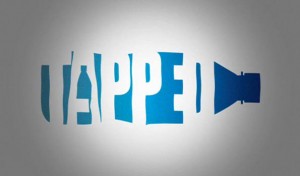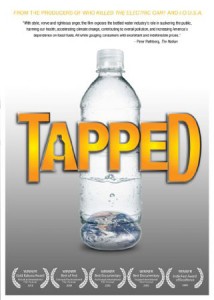Written By: Emily Osborne
Water. We all know it’s an essential life ingredient. Every day we are likely to drink it, bathe in it, brush our teeth with it, and use it to wash our dishes. So, should we consider water a fundamental human right or a corporate controlled commodity? Unfortunately, water is most often treated as the latter. The documentary film, “Tapped,” delves deep into the story behind the 80 million bottles of water that Americans consume every day.

The story begins in the small town of Fryeburg, Maine where Nestlé, a large bottled water profiteer, decided to start pumping water from the local freshwater supply. However, Nestlé did not consult the Fryeburg community about its water mining plans and none of its profits have returned to benefit the town. During the summer drought of 2007 in North Carolina, major companies such as Pepsi and Coca Cola refused to stop bottling water, even temporarily, while residents were under severe water usage restrictions. These stories are repeated across the country due to the fact that water is seen merely as a product instead of a precious resource.
While advertisements claim that bottled water is “safe,” “healthy,” and “pure,” a little research shows that water from plastic bottles does not always live up to its labels. In fact, the long-term effect of drinking from plastic bottles has not been thoroughly examined, although we do know that plastic contains chemicals that are harmful to our health. Plastic is derived from crude oil and the refineries where plastics are manufactured are a major source of pollution, which contaminates the surrounding water, soil, and air. The ads also imply that bottled water is better quality than tapped when the reverse is actually true. Tapped water undergoes strict municipal tests to ensure its purity while the same regulations do not apply to bottled water. Large bottled water companies conduct their own testing and are not required to publish their reports for the public.
Ideally, plastic bottles would be recycled when we’re done with them, but 30 million water bottles consumed on a daily basis in America end up in a landfill instead. Many plastic bottles find their way to the ocean where they pose a threat to marine life.

Water bottles are meant to be an on-the-go convenience, but how convenient are the environmental and health concerns they add? It has been predicted that by 2030, two-thirds of the world will lack access to clean drinking water. What is currently a problem for developing countries will soon become a problem for everyone. Fortunately, many activists are already at work to protect water, demand accountability from corporations, and ask for more government regulation. Here are a few things you can do, too:
- Don’t buy bottled water!
- Be mindful of your water use.
- Recycle plastic bottles.
- Buy a water filter.
- Use a reusable water bottle.
- Write to your local government to protect fresh water and repair water infrastructure.
- Demand that bottled water companies publish quality reports and make them available to the public.
Visit https://streamingmoviesright.com/us/movie/tapped/ for more information.
